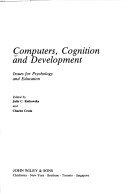Developmental Psychology and Its Applications
1 total work
Computers Cognition and Development
by Julie Rutkowska and Charles Crook
Published 16 September 1987
This timely book identifies and explores key ways, both practical and theoretical, in which computers and the notion of computation are important for developmental psychology and education. The contributors are research workers actively involved in artificial intelligence, developmental and cognitive psychology, and education, and they reflect on their own problem fields in ways that help define issues and strategies for future developmental research. The book is divided into three parts - Part I looks at how the new technology is restructuring young children's experience of education and leisure; Part II explores how insights that arise from the discipline of artificial intelligence may help define new computer-based environments for human learning; and Part III looks at the strengths and weaknesses of current computational models of learning processes. The book as a whole offers an introduction to otherwise diverse, dispersed and technical material in this important and exciting new field.
